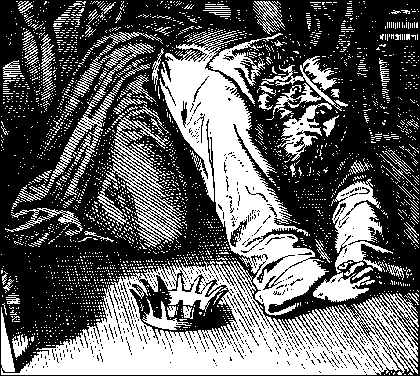 | |
| via stpeterslist.com |
In our first reading, we have the occasion of that original sin, the Fall of Adam and Eve. They disobeyed God's command not to eat from the Tree of the Knowledge of Good and Evil. They failed to trust God's promises, and they believed the devil's lies, and so they disobeyed, and fell. And as St. Paul says in the second reading, this sin had great consequences for all of us: "By the disobedience of one man, sin entered the world, and with sin, death."
This doctrine of original sin is central to so many of the teachings of our Catholic faith. Original sin
 | |
| Matteo de Nassaro, slate bas-relief ca. 1501, via commons.wikimedia.com |
Yet we live in a time and a culture which tries so hard to deny the reality of original sin. The devil is still lying to us! He wants to make us fall, as he made Adam and Eve fall, and the best weapon he has to do so is to deaden our sense of sin. And so our world denies original sin and its consequences. It does so in very many ways, but I'd like us to consider just one of those ways right now.
The world tries to claim that what makes something right and true is if it comes out from the depths of one's heart. The world rejects God as illuminating what is right and wrong, rejects the Bible, rejects Tradition, rejects the wisdom of the past. None of these, and no other person, the world wants us to think, can tell us what is right and wrong, but only what is in our heart. Therefore, if you want something strongly enough, it must be right to want it. Now obviously, there is a grain of truth in this idea. There are many deep desires in our hearts that are good, love and forgiveness in the imitation of Jesus Christ foremost among them. But also obviously, there are many desires in our hearts that are equally deep, that are not at all good. We are all capable of many kinds of anger and violence and damaging the dignity of other people. Clearly, having a desire to harm someone else doesn't make harming them right.
As an example of this dynamic of the mystery of sin, consider the pornography which fills our culture. The world wants to say that there's nothing wrong with pornography, that it's simply normal. The people who make pornography are doing so freely, and don't seem to be harmed by it. The people who consume the pornography are expressing a personal desire by doing so. So where's the harm, or the sin?
 |
| King David praying - maybe Psalm 51? |
This season of Lent, just beginning, is a precious gift to each of us, an opportunity to examine our hearts and our lives in the light of Christ. Has the world's denial of sin encroached on our faith? Do we make worldly excuses for our sins? Is there some part of our life where we are still dead because of sin? Do we perhaps resist the holy desire for Christlike purity in mind and heart? Now is the time to let the light of Christ, the mercy that flowed from His side on the Cross, begin to heal that darkness. Jesus Christ conquers sin and death, refusing every temptation of the devil. His Gospel is good news! It's good news for us because it means that we too don't have to be mastered by sin, or defined by our sins. In Him we can say no to sin - not by our own strength, because we are weak, but in Him, in His perfect power and mercy and forgiveness. Now is the time to examine our lives and echo Chesterton's humble admission, to beg our Savior Jesus Christ for His mercy. Each of us can say that we are truly a sinner, in great need of His mercy, but longing to be healed and freed from our sins. In this Lent, God invites us to accept totally the words we heard just the other day, on Ash Wednesday: Repent, and believe in the Gospel.
No comments:
Post a Comment